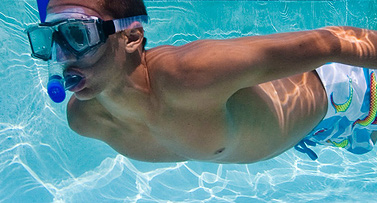
18/06/2018What Effect Does Rain Have on Pool Water?
If you own a pool and it is the summertime, then you know your days will be filled by fun and frolicking. There is nothing better than a cool dip on a hot day, playing games and sports in the water, or even just lounging by the pool with your favorite cold beverage. That said, there is no avoiding the rain when it comes in the summer. The thing is, that extra water can affect your pool water and mess with the chemistry. It can make your pool unsanitary and potentially even cause it to lose its visual appeal. Strangely enough, the chemical imbalance does not come from the chemicals being diluted in the extra water.
The problem lies in what comes with the water, not how much rain water there is. Algae and other airborne debris is carried with the rain drops and are deposited into the pool. These are what cause the issues with your pool. Algae spores are always floating in the air and can be carried in the wind. They seek out damp places with standing water, and your pool would be a prime target. During the rain these spores get rinsed into your pool water. Spores that are attached to any plants or vegetation also get rinsed off and tend to make their way to your pool.
When this toxic mix of algae and other contaminants get into your pool water, you must take care of it quickly. It can all cause chemical reactions with the chlorine in your water to make it less effective. Also, as organic matter in your pool decomposes, the algae and other organic matter will feed on it and reproduce even faster. If your pool is in a sunny spot and it is hot out, then you are in for a lot of reproduction.
What needs to happen to fix this is that you must kill algae in your pool faster than the rate that it is reproducing. If you are killing algae, but it can reproduce faster than you kill it, then you are not helping things at all. That means purchasing algicide and keeping its level at a high range. This range is recommended on the product’s packaging. Algicide does not decompose in chlorine or sunlight, so it will keep killing algae as long as there is enough in the water to do the job.
Debris in the pool water that gets deposited during the rain can also harm the delicate chemical balance in the pool. After every rainfall, test your pool water to make sure that your chemicals are in balance. If not, then add the right chemicals to get it in balance again. It is also good to test regularly in between rainfalls as well. If you keep your Total Alkalinity in the right range, then it can protect the pool water from the pH of the rainwater causing too many issues. Rainfall is inevitable at some point, so there is no harm in protecting your water.
Another way to protect your pool during the bad weather is to secure any yard furniture or other loose objects. During rainstorms, there is often a lot of wind. These items in your yard can get blown into the water. That may not seem like a problem, but those items are often dirty and will bring that dirt into the water. There are some people who even place them in the pool on purpose before a storm to protect them from blowing around the yard. This is a bad idea, and finding a way to secure them is the much better option.
As you can see, rainwater is not a good addition to your pool. It can provide a breeding ground for some nasty materials that can make you and your family sick. Test your pool regularly to keep your water well-balance to protect and fight against these contaminants before and after rainwater gets into your pool.



